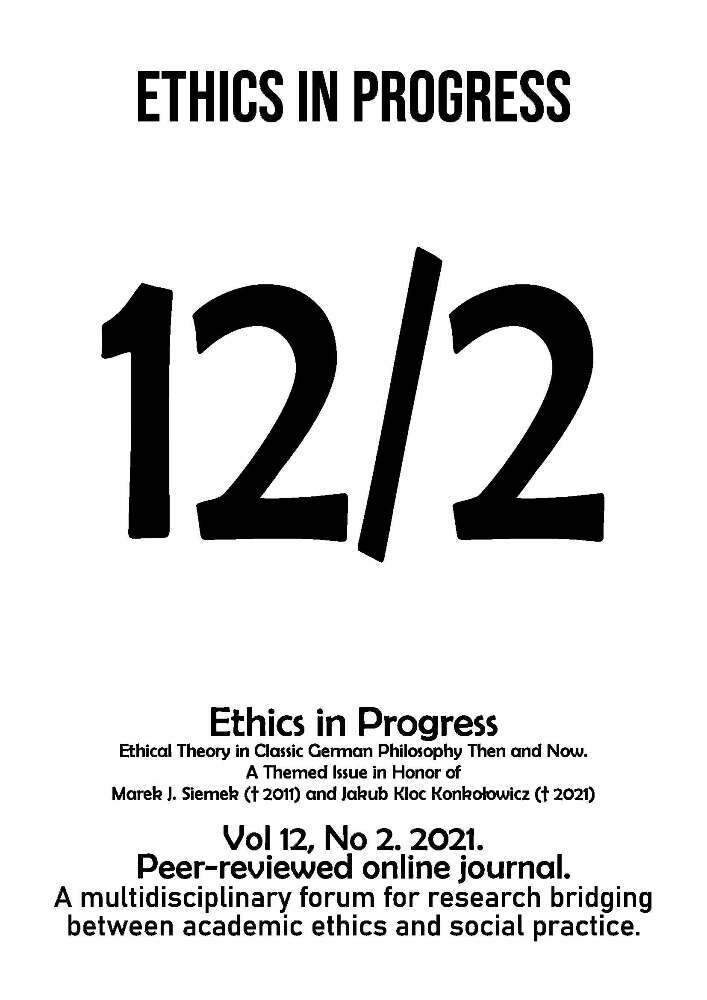Abstract
In this paper, it will be shown that Hegel’s philosophical thematisation of subjective freedom has given a fundamental contribution to the historical innovation of modernity, which regards not only human rights, but also norms and values. Besides, it played an important role concerning the cultural transformation, i.e., the process of the realization of the historical innovation oriented towards the ideals of modern freedom. To show this, the author will focus on some passages from Hegel’s Philosophy of Right of 1820, in which Hegel regarded subjective freedom as universally-normative and, at the same time, as socially and historically contextualized (situated, respectively). Hegel, namely, explicates modern freedom in its ideality and moral normativity, addressing its realization in particular forms of life. Marriage, for instance, as it will be shown towards the end of this contribution, exemplified as the right to particularity, is the normative basis of modern subjective freedom. Tensions and collisions will permanently challenge this type of freedom and also require permanent (and self-defeating) efforts invested in striving for a (too contextualized and situated) „reconciliation“ (in Hegel´s terms Versöhnung).
References
Hegel G. W. F. 1970. Grundlinien der Philosophie des Rechts (1820). Werke. Bd. 7, hg. von E. Moldenhauer und K. M. Michel. Frankfurt am Main: Suhrkamp.
Hegel G. W. F. 1970. Enzyklopädie der philosophischen Wissenschaften im Grundrisse (1830), Teil III: Die Philosophie des Geistes. Werke. Bd. 10, hg. von E. Moldenhauer und K. M. Michel. Frankfurt am Main: Suhrkamp.
Hegel G. W. F. 1993. Vorlesungen über die Philosophie der Religion. Einleitung, Manuskript von 1821, hg. von W. Jaeschke. Hamburg: Felix Meiner Verlag.
Joas H. 2011. Sakralität der Person. Eine neue Genealogie der Menschenrechte. Berlin: Suhrkamp.
Oehl T. 2021. Die Aktivität der Wahrnehmung und die Metaphysik des Geistes. Eine aktualisierende Lektüre von Hegels Philosophie des Geistes. Tübingen: Mohr Siebeck.
Quante M. 2011. Wirklichkeit des Geistes. Frankfurt am Main: Suhrkamp.
Rorty R. 1996. „Menschenrechte, Rationalität und Gefühl,” in: Die Idee der Menschenrechte (S. 144–170), hg. von St. Shute & S. Hurley. Frankfurt am Main: Fischer Taschenbuch Verlag.
Rózsa E. 2007a. „Subjektivitätsproblematik und Identitätsprobleme in Hegels Rechtsphilosophie: systematische Überlegungen und das Beispiel des Mannes”, in: dieselbe, Hegels Konzeption praktischer Individualität. Von der „Phänomenologie des Geistes” zum enzyklopädischen System (S. 103–120). Paderborn: Brill – Mentis.
Rózsa E. 2007b. „Besonderheit, ’besondere Existenz’ und das Problem der praktischen Individualität bei Hegel,” in: dieselbe, Hegels Konzeption praktischer Individualität. Von der „Phänomenologie des Geistes” zum enzyklopädischen System (S. 121–181). Paderborn: Brill – Mentis.
Rózsa E. 1997. „Hegels Auffassung der Versöhnung und die Metaphorik der Vorrede der Rechtsphilosophie. Risse am System?”, Hegel-Studien 32:137–160.
Siep L. 2020. „Transformationen des Geistes”, Hegel-Studien 53/54:275–299.
Tillich P. 1962. Die verlorene Dimension. Hamburg: Furche Verlag.
Walzer M. 1990. Kritik und Gemeinsinn. Drei Wege der Gesellschaftskritik. Berlin: Rotbuch.




